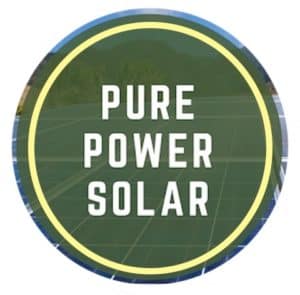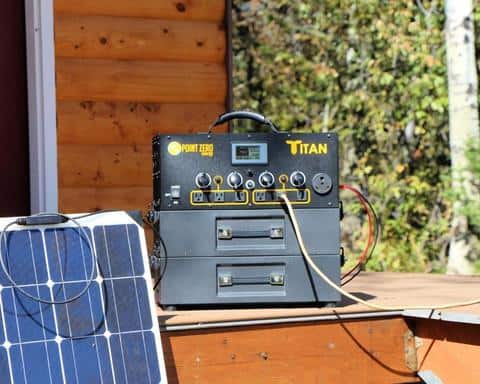We are aware that the sun not only helps us to recognize the difference between day and night but also to provide us with light and heat.
Half of the sun’s radiation is absorbed or reflected by the clouds and the atmosphere.
But do you know that even after this, the energy that reaches the earth is abundant?
This energy is a clean resource that supports different lifecycles that otherwise may not be sustained. The sun’s energy is an inexhaustible energy source and provides us much more than we need to power everything on the Earth.
The U.S. Department of Energy proclaims that the energy we receive from the sun for about one and a half hours is more than adequate to manage the Earth’s entire energy consumption for a year.
Think of this: only 18 days of sunlight that reaches the earth has enough energy to be equivalent to the energy from the Earth’s entire reserve of coal, natural gas, and oil.
Our future depends on how effectively and efficiently we use this abundant natural resource and cut down on the use of depleting resources like coal and oil.
But can we make it work for us every day to run an essential item like the refrigerator?
You can run a refrigerator with solar power, but it is not as simple as connecting solar panels to the refrigerator itself. You will also need to use a battery, charge controller, and inverter to complete the setup necessary to run your refrigerator from solar power.
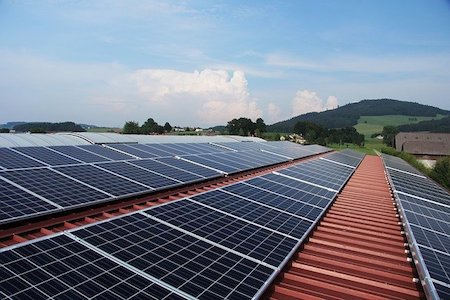
The Basics of Solar Energy
Solar energy systems consist of two types of technology:
1) Photovoltaic (PV)
The commercial use of solar power as a source of electricity started when Bell Labs introduced the very first silicon photovoltaic cell in 1954 . The acceptance was slow after its invention, but with the help of state and federal incentives, the costs came down, and it was widely adopted. The solar panels used in this technology are usually placed on the rooftops or walls of houses or commercial properties to continually generate solar energy without interruptions.
. The acceptance was slow after its invention, but with the help of state and federal incentives, the costs came down, and it was widely adopted. The solar panels used in this technology are usually placed on the rooftops or walls of houses or commercial properties to continually generate solar energy without interruptions.
The photovoltaic panels are usually installed at three different scales: commercial, residential, and utility levels. Residential-level solar panels are designed to be used on small scale properties and are usually installed on rooftops. This offers a place to capture uninterrupted sunlight without taking up any additional space on the property.
The commercial-levels of solar panels are generally larger and are installed on a broader scale. The commercial solar projects can either provide solar energy for businesses or can be used for non-profit purposes. The utility-level solar projects are on a grand scale with various megawatt installations used to power a huge number of customers.
are on a grand scale with various megawatt installations used to power a huge number of customers.
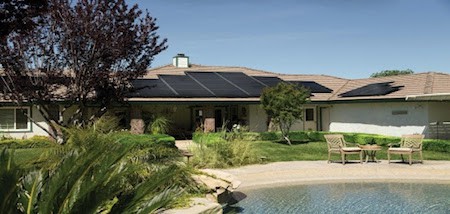
2) Concentrated Solar Power (CSP)
The other technology used in solar power is concentrated solar power . This technology is typically used for massive power plants and is not ideal for small scale or residential use. In this technology, mirrors are used to reflect the sunlight to concentrate it onto receivers. These receivers collect solar power and convert it to heat. This heat is attached to an electrical power generator, usually through a steam turbine, to produce electricity.
. This technology is typically used for massive power plants and is not ideal for small scale or residential use. In this technology, mirrors are used to reflect the sunlight to concentrate it onto receivers. These receivers collect solar power and convert it to heat. This heat is attached to an electrical power generator, usually through a steam turbine, to produce electricity.
Can You Run a Refrigerator on Solar Power?
Using solar power devices is becoming a common trend; it cheaper in the long run and is amazingly easy to use. We can see solar-powered lights , rechargeable batteries, and solar water heating appliances being used widely. The easiest way to use solar power is by using outdoor lights. These lights will capture the sunlight during the daytime, convert it and store it to use at night-time. But can solar power be used to run a refrigerator? The answer is YES!
, rechargeable batteries, and solar water heating appliances being used widely. The easiest way to use solar power is by using outdoor lights. These lights will capture the sunlight during the daytime, convert it and store it to use at night-time. But can solar power be used to run a refrigerator? The answer is YES!
Refrigerators are designed to keep the food safe by keeping it consistently cool. For this, the refrigerators need a continuous power supply. Solar power can vary based on the weather; if it is not sunny, the power generation may not be consistent. However, with the correct configuration and the right use of devices, you can run a refrigerator with the help of solar energy.
The power consumption in each household can vary a lot based on the living practices of the family members. If there is no one in the home to use the refrigerator during the day, it will need less power compared to a family with kids who can open the refrigerator every now and then. It also depends on other factors like how old the fridge is, how much food you store in it, or how long you keep the refrigerator open.
What Will You Need?
To run a refrigerator on solar power, we will need a few devices in unison with solar panels. We need batteries to store the power to be used when it is cloudy or during the night. A charge controller is required to make sure the power flows from the panels to the battery consistently without any fluctuations. This controller will also monitor the voltage and the current. The setup will also need an inverter to convert direct current (DC) to alternating current (AC).
Power Utilization of the Refrigerator
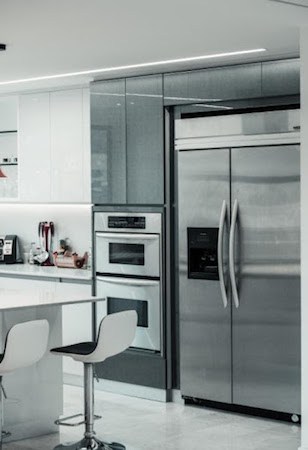 Refrigerators are of different sizes: A mini-fridge, medium-sized refrigerator, or a large-sized refrigerator for a big family. Hence, the consumption of power for each refrigerator depends on its size; larger refrigerators use more power while the smaller ones require less power consumption. If you are planning to use solar power for your refrigerator as a backup for power outages, it is ideal to choose medium or small-size refrigerators to store highly-perishable food items. Nevertheless, it is still possible to run a large refrigerator with solar panels and the other required components. The only caveat is that you may only have a couple of hours of power depending on the size of the battery and capabilities of the inverter.
Refrigerators are of different sizes: A mini-fridge, medium-sized refrigerator, or a large-sized refrigerator for a big family. Hence, the consumption of power for each refrigerator depends on its size; larger refrigerators use more power while the smaller ones require less power consumption. If you are planning to use solar power for your refrigerator as a backup for power outages, it is ideal to choose medium or small-size refrigerators to store highly-perishable food items. Nevertheless, it is still possible to run a large refrigerator with solar panels and the other required components. The only caveat is that you may only have a couple of hours of power depending on the size of the battery and capabilities of the inverter.
Before setting up solar power to run your refrigerator, find the power consumption of your refrigerator. The information about the refrigerator’s voltage and current requirements will be mentioned on the refrigerator booklets or in the rating lists on the appliance.
The Setup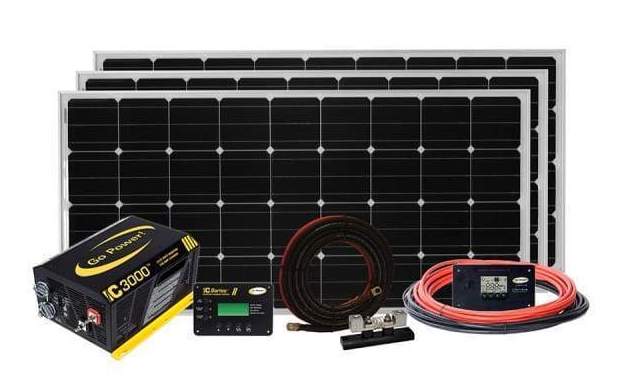
1) Solar Panels
Once you determine the power consumption of your refrigerator, you can move to the next step. The next step is considering how many solar panels you will require. The solar panels have photovoltaic cells; these cells absorb the sunlight or the photons and convert them into solar electricity. The photovoltaic cells are created from silicon, giving them a positive as well as a negative side, which helps to transmit the electricity. The direct current generated by the panels will vary according to the weather conditions, but consider the panels are generating 75 watts, and you get an average of five hours of sunlight every day. This way, you can produce 375 watts per panel for one day. To calculate the number of panels required, you need to divide the daily watt-hours for the refrigerator by the energy produced by each panel.
1,600 daily watt-hours / 375 watts per panel = 4.27 panels
Round up to five panels. This gives you a rough idea of the number of panels needed. The energy produced by the panels depends on its size, so the number of panels required can reduce or increase based on the space available.
The photovoltaic cells start generating direct current as soon as the sunlight reaches the panels. But the direct current cannot be used to power up your refrigerator on its own. This is where the solar inverters come into the picture.
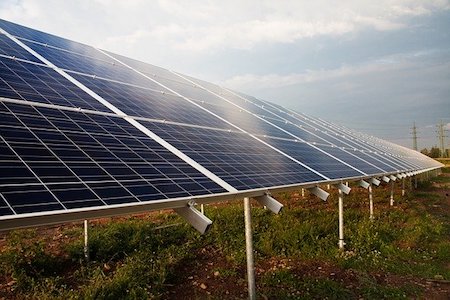
2) Solar Inverters
The solar inverters convert the direct current from the solar panels to alternating current that can be used for the refrigerator. The inverters for solar panels can be of various types. Some panel setups might have a single inverter that is often known as the “string” inverter. While others can have a micro-inverter connected to a single solar panel. The energy produced by these panels is not consistent as it depends on the amount of sunlight. The transformer or a charge controller
connected to a single solar panel. The energy produced by these panels is not consistent as it depends on the amount of sunlight. The transformer or a charge controller can help to resolve this issue by adjusting the volume and type of power supplied to the refrigerator.
can help to resolve this issue by adjusting the volume and type of power supplied to the refrigerator.
3) Solar Batteries
When you consider generating and storing solar energy, you will come across a lot of battery options. To choose the one that best suits you, you need to consider a few things like the batteries’ capacity, round trip efficiency, etc. The amount of electricity stored by a battery is typically measured in watt-hours (Wh) and/or kilowatt-hours (kWh). You can use multiple solar batteries to get the additional capacity to store solar power.
You need to consider the battery’s power output to understand how much electricity a single battery can provide. The power output of a battery is measured in watts (W) and/or kilowatts (kW). You can choose the power output of a battery based on your requirements. A solar battery with higher capacity but lower power output will provide an adequate amount of electricity to run an appliance for a long time. Whereas, a solar battery with higher power output but low capacity can only support multiple appliances for a few hours. The lithium-ion batteries work best in most weather conditions. You can also consider other options like lead-acid batteries.
Due to the chemical composition of a battery, it always needs to preserve some charge. Without this, their life expectancy will be shortened. The DoD or Depth of Discharge denotes the battery’s capacity of use. The higher the DoD, the more you can utilize your battery’s capacity.
4) Charge Controller
The solar power produced by the solar energy system can fluctuate a lot for various reasons. This fluctuating energy can damage the batteries or even your refrigerator if they were directly connected together. The charge controller helps to regulate this energy to flow smoothly. It prevents overheating of the connected components and keeps them safe from malfunctioning.
By configuring all these components together accurately, you can successfully run your refrigerator on solar power.
Similar: Top 5 Off Grid Gadgets to Thrive Out in the Wild
Advantages of Using Solar-Powered Refrigerators
Refrigerators are used to store perishable food items that cannot last longer if kept at normal temperatures. Interruption in the power supply can affect the quality of food even if it is stored in the refrigerators. Here are a few advantages of using solar-powered refrigerators to overcome these issues.
1) Don’t Have to Worry About Power Outages
If you are staying in a region with frequent power outages, using a solar-powered refrigerator is the best choice for preserving your food. The refrigerator can run on solar power without using electricity from the grid, so your fridge will keep working for at least a couple of hours (depending on the battery size) without worrying about losing power. You can also use the solar-powered refrigerator as extra storage space to keep highly perishable or frozen food that you need for your household.
2) Easy Setup
To run your refrigerator on solar power, you will need only a few components: solar panels, batteries, a charge controller, and an inverter. With the proper setup, you will be able to keep your fridge working continuously even during the night or cloudy weather. Now there may be a time where you need to recharge the batteries, but if your solar input is equal to the output of the battery to the refrigerator, you can run the refrigerator as long as you want because there is no shortage of power as the battery is being constantly charged. If you have a smaller input from solar panels than the output into your fridge, then you will need to take time to recharge the battery from solar.
3) A Clean Source of Energy
Solar energy is a clean source of energy that means it does not pollute the environment in any way. The regular refrigerator will need a constant supply of electricity, which is produced using other valuable resources like coal.
4) Scalable
You can add more solar panels and batteries to run larger refrigerators and/or other home electronics smoothly.
5) Portable Setup
You can use mini-refrigerators to use in places where there is no electric supply, like while camping or tailgating.
6) Low Maintenance
Maintaining the solar energy system installed in your house does not require much maintenance. Keeping the solar panels clean will be sufficient to maintain them. You can also take help from a specialist to keep the panels clean. The majority of solar energy system manufacturers guarantee the components run for an exceptionally long duration (decades) without any wear and tear.
Similar: Top 15 Best Solar Generators for Camping (Small to Large)
The Utility of Solar Generators
The solar panels capture the sunlight and convert it to the energy which is processed through the charge controller. This charge controller is then used to power up the batteries. The inverter is responsible for converting the direct current to the alternating current so that the devices can use it without any issues.
Advanced solar generators can have other safety features like a circuit breaker that will ensure the devices are not pulling a huge amount of electricity.
There are various solar power stations on the market; The Goal Zero Yeti 3000 is one of them. This is the most comprehensive, high-capacity transportable power station. The Goal Zero Yeti 3000 is a one-button push power station that can store 3000Wh in a lithium battery and can be used for a long-duration on various devices. The Yeti 3000 can be connected to the Goal Zero Yeti app using Wi-Fi for monitoring its usage over the phone.
is one of them. This is the most comprehensive, high-capacity transportable power station. The Goal Zero Yeti 3000 is a one-button push power station that can store 3000Wh in a lithium battery and can be used for a long-duration on various devices. The Yeti 3000 can be connected to the Goal Zero Yeti app using Wi-Fi for monitoring its usage over the phone.
The Titan Solar generator is another versatile solar generator on the market. The Titan solar generator has a large battery capacity and the battery itself has a lifespan of about 10 years!
is another versatile solar generator on the market. The Titan solar generator has a large battery capacity and the battery itself has a lifespan of about 10 years!
Conclusion
The sun provides us with a larger energy supply than we could ever use. Everyone who has compatible devices can take advantage of its power. It can easily be used to power up everyday appliances like the refrigerator, television, and other devices. It will not only cut down your electricity expenses from the day it is installed, but it can also save us from overusing limited resources like oil and coal.
Continue Reading:
